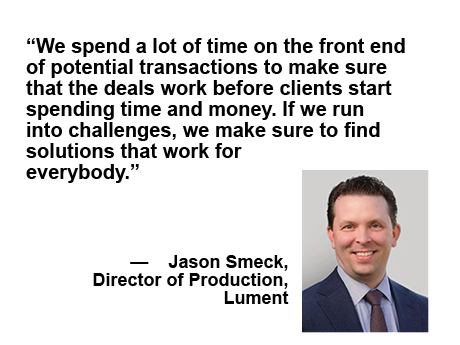Seniors housing acquisition and development is a costly business these days. Inflation has increased the price of construction materials, and wage pressures are driving up personnel costs. And after nearly two years of interest rate hikes to slow inflation, debt service on short-term construction and bridge loans is straining borrowers’ budgets and potentially threatening their ability to qualify for take-out financing when their properties reach stabilization.
That is, if they can even source a long-term mortgage from increasingly risk-averse regional banks distracted by today’s market volatility, says Jason Smeck, director of production at Lument. As a leading lender to the seniors housing industry, Lument is encountering renewed client interest in loans backed by the Federal Housing Administration (FHA) and the government-sponsored enterprises (GSEs) Fannie Mae and Freddie Mac. Many of those clients describe dealing with regional banks that showed a diminished appetite for issuing new loans.
“Banks are focused on cleaning up their existing portfolio and getting their house in order rather than pursuing new business, and that focus on existing clients has them turning some applicants away,” Smeck says. “Bank lending also involves floating-rate risk, and that has steered some applicants to investigate other avenues for financing.”
Borrowers Weigh Options
Agency financing offers some of the best terms available including low interest rates, high loan-to-value ratios and lengthy amortization periods, but can be a tough sell to borrowers inexperienced with agency loan products. Dealing with government or quasi-governmental entities adds layers of due diligence and obligations that can extend to third-party seniors housing operators as well as the borrower. Some loan products require conformance to federal wage rules, for example, as well as accessibility and environmental standards.
Conventional bank loans are more straightforward but tend to require personal guarantees and carry higher interest including floating rates, particularly on the three- to five-year financing used for construction or acquisition. In the more favorable interest-rate environment of a few years ago, many borrowers would return to regional banks for take-out financing after construction, accepting a higher interest rate and financial covenants that came with a simple application process and rapid funding.
Today, however, more borrowers are going the agency route to prearrange long-term financing at a known, locked-in interest rate, Smeck says. Some products, including certain FHA loans, even give borrowers the opportunity to refinance down the road to take advantage of a reduction in market interest rates.
GSE loans for seniors housing can only finance operating properties and are therefore unsuited to construction or acquisitions that require a renovation period before the owner achieves stabilized occupancy, Smeck says.
Some applicants qualify for financing under the U.S. Department of Housing and Urban Development that can be used for construction or acquisition, however. More often, the developer will pair a short-term bank loan, investor equity or other sources of construction funding with prearranged long-term financing under one of the federal programs, Smeck says.
Prep for the Agency Process
Loan applicants seeking agency financing for their seniors housing projects should prepare for a lengthy process, Smeck says. FHA loans also demand a substantial up-front investment for due diligence, legal fees, deposits and other expenses.
“With an FHA loan application, it could be five to six months from the time of engagement to the time that you can lock in a rate and move to closing,” Smeck says. “That’s a much longer timeframe than it would typically take for a bank or for a loan through Fannie or Freddie.”
An FHA loan precludes cashing out property equity directly through the loan, Smeck says, so borrowers planning to extract equity should plan to do so through some other mechanism before closing on FHA financing.
Lument works to smooth the loan application process by first listening to clients’ needs and identifying the best products to help meet their goals. Agents share how various products have worked for clients in the past, describe any rule changes and explain how those may affect the client’s experience.
“We spend a lot of time on the front end of potential transactions to make sure that the deals work before clients start spending time and money,” Smeck says. “If we run into challenges, we make sure to find solutions that work for everybody.”
To clients concerned that their agency loan application will be subject to bureaucratic indifference, Smeck counters that the professionals underwriting their loan, as well as those reviewing the application at the GSEs or HUD, are committed to finding solutions and placing loans. “The people we deal with at these agencies are specialists in seniors housing and healthcare, and they truly understand those businesses,” he says. “Over my 20-plus years in the industry, I’ve found these are individuals that work hard and want to get deals done just as much as we do.”
Smeck’s final word of advice to agency borrowers is to consider retaining a dependable asset manager to maintain compliance with the conditions set out in the loan documents over the life of the loan.
“Anytime there are changes post-closing, those need to be run through the FHA or agency for approval,” Smeck says. “An experienced asset manager will understand what needs to be done and how it needs to be presented to make it easy for the FHA or agency staff to respond. It’s a delicate balance of being concise and also providing enough information so the agency can make a decision.”
— By Matt Hudgins. This sponsored content was written in conjunction with Lument, a content partner of Seniors Housing Business.

